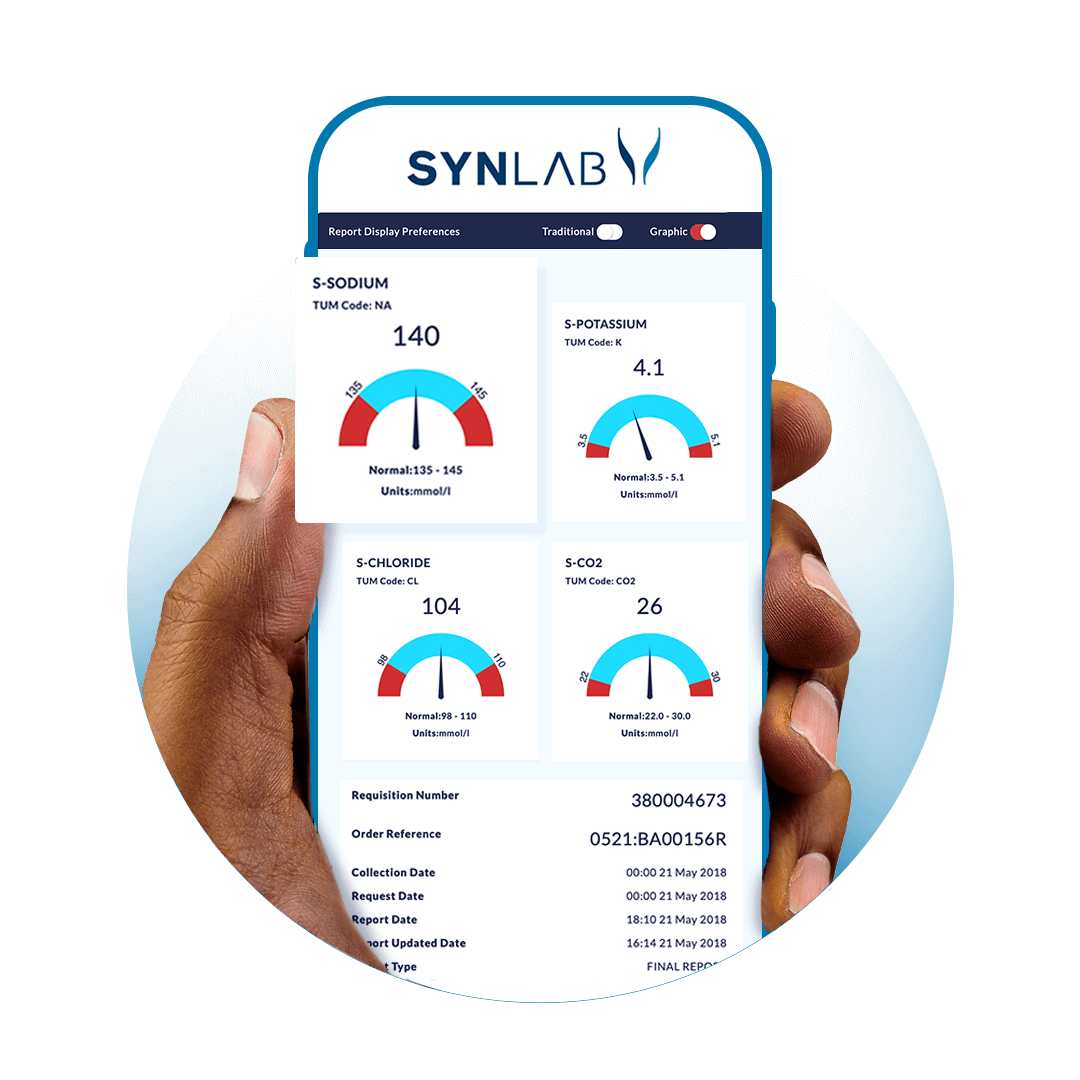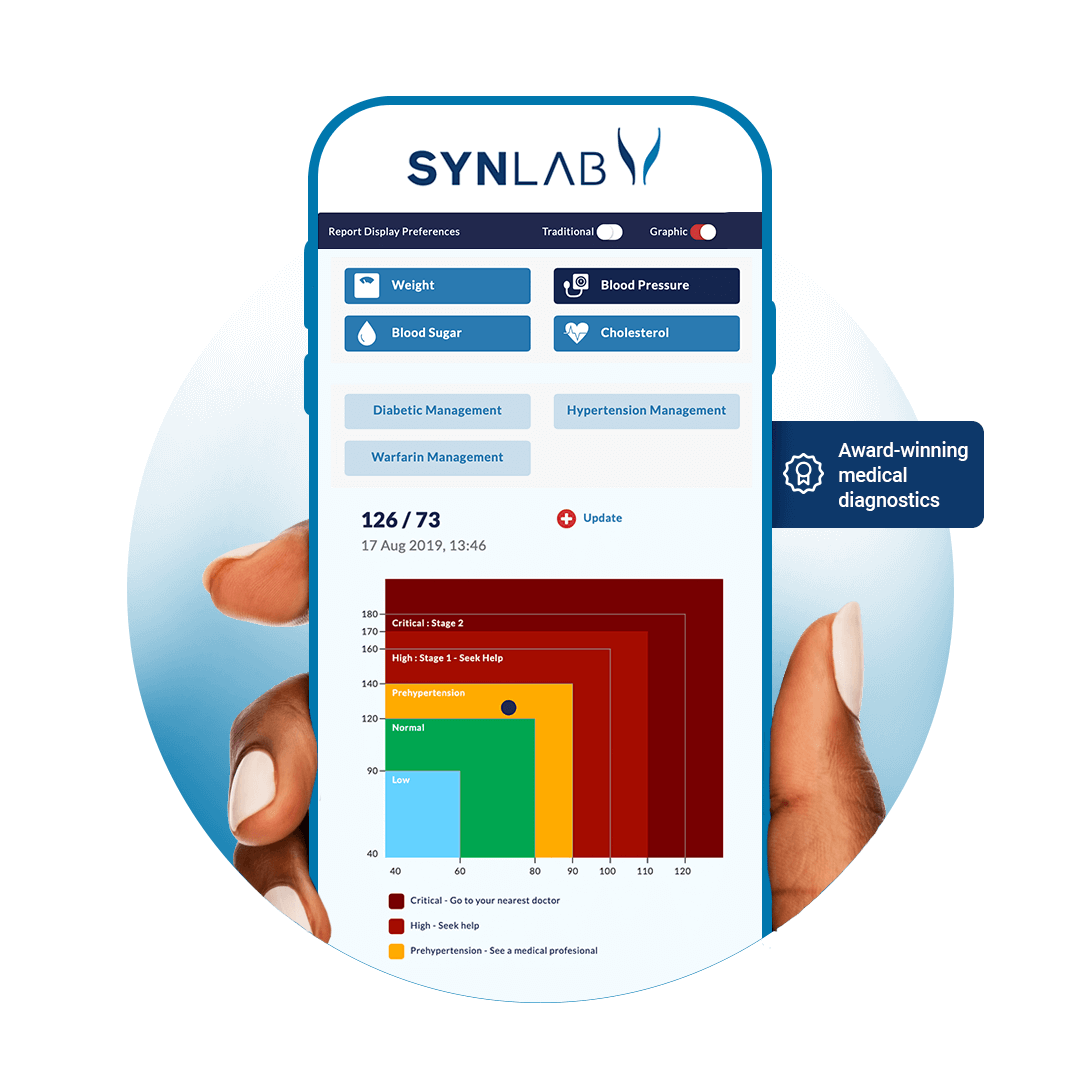Clotting
Blood clotting tests are essential in determining the presence of blood clotting disorders and management of people on blood thinners. Get tested. Take control of your health.
Confidential
Quick turnaround
Reliable accuracy
Prothrombin Time (PTT)/International Normalised Ratio (INR)
Partial Thromboplastin Time Test (PTT)
How it works

Order online
Order your test online, select, and pay for your preferred panel.

Collect your sample
Choose to have our medical team come in for home sample collection or visit a Synlab centre near you for your sample collection.

Review accurate results
Accurate and confidential results are available on your secure online Pathprovider account. You will get notified as soon as your results are available.

Get medical support
If you have any queries, please contact our 24-hour customer support centre at +234 700 7284 2273.
STATISTICS
1 in 5
People with cancer develop blood clots.
1 in 4
People worldwide die from conditions related to blood clots.
200,000
Nigerians die from thrombosis every year.
The formation of blood clots is an important part of the body’s response to any injury that causes bleeding.
It stops bleeding and is also important in the healing process. Several protein molecules, most of which are produced in the liver, cells, especially platelets, and Vitamins (especially K), are required to be present in the right amounts for clotting to occur normally.
There are several disease conditions that could result in or are associated with a reduction in the body’s ability to form clots and result in excessive bleeding (haemorrhage) or an increase in clotting activity which causes clots to obstruct blood flow (thrombosis).
A reduction in the body’s ability to form clots may be characterised by
- Easy bruising
- Bleeding gums
- Heavy bleeding from small cuts or dental work
- Unexplained nosebleeds
- Heavy menstrual bleeding
- Bleeding into joints
- Excessive bleeding following surgery
The symptoms of an increase in the body’s ability to form clots is determined by where the clots lodge in the body, for example:
- Brain: Weakness or paralysis on one or both sides of your body, slurring speech, inability to move one side of your face and headache.
- Heart: Chest pain, shortness of breath, weakness, fast or irregular heartbeat, heart palpitations (feeling your own heartbeat) and passing out.
- Lungs: Wheezing or sudden problems breathing, pain in your chest, coughing blood, fingertips or lips that are pale or blue-tinted and passing out.
- Lower limbs: Pain in the calf or elsewhere in the leg, as well as swelling or redness. However, blood clots in your leg can sometimes have relatively minor symptoms and may just feel like a pulled muscle.
- Kidneys: Blood in your urine, reduced urination, and pain in your lower back on either side of your spine.
Factors that increase your risk of developing a blood clot
Obesity

Immobility (including prolonged inactivity)

Pregnancy
Smoking

Oral contraceptives
Certain cancers

Diabetes

Trauma
Certain surgeries
Age (increased risk for people over age 60)
A family history of blood clots
Chronic inflammatory diseases

High cholesterol

High Blood pressure
Common blood clotting disorders:
- Genetic disease
These include conditions where a person inherits a reduced or loss of the ability to produce the proteins that are essential for coagulation. Such diseases include Haemophilia and von Willebrand disease. - Liver disease
Diseases that result in the liver’s inability to produce coagulation-related proteins. - Vitamin K deficiency
This is especially common in breastfed babies but may also occur in adults.
Frequently Asked Questions
If you are still unsure about this test, here are some questions that we usually get asked.
Still need answers?
What is deep vein thrombosis?
Deep vein thrombosis (DVT) occurs when a blood clot (thrombus) forms in one or more of the deep veins in the body, usually in the legs. DVT can cause leg pain or swelling. Sometimes there are no noticeable symptoms.
What is a pulmonary embolism?
An embolus is a clot that forms in one part of the body and then travels in the blood to another part of the body to cause a blood vessel blockage. Pulmonary embolism (PE) occurs when the final destination of a travelling clot is a blood vessel in the lungs. Very frequently, pulmonary emboli originate from clots formed in the leg’s deep veins (DVT).
Are blood clots preventable?
Blood clots are among the most preventable types of blood conditions. There are several ways to decrease your chances of developing a blood clot by adopting appropriate lifestyle patterns. Talk with your doctor if you think you may be at risk because of genetic or behavioural factors. Also, make sure your doctor is aware of all the medications you are taking and any family history of blood clotting disorders.
Benefits
When you get your test done with SYNLAB, you have access to our benefits.
Customer-centric reporting
PathProvider gives you direct access to all of your test results and reports across all your devices without having to leave your home.
Benefits of being a PathProvider registered user
- Your profile is a secure personal space
- Access your results any time, any day, all year round
- Results can be checked on any smartphone, computer, or tablet
- All your previous results are archived on your profile
- Set your notification preferences when results are ready. Choose email or SMS.
- Not a doctor? Switch to the popular ‘graphic view’ and get to understand your results.
- You can share or print your results directly from your profile.


Choose home collection.
Get complete convenience
Get your results as they become available online.
You can choose to get your entire family tested in the comfort of your own home. Choose a day and a time that is convenient for you, and we’ll send one of our trained professionals to your door.
No more sitting in traffic. Now you can manage your health in the comfort of your own home.
Total confidence.
Award-winning medical diagnostics
Accuracy of results, reliability, trust, and quick turnaround time.
We are audited by an external body which ensures that we implement the highest ethical standards and international best practices.
SYNLAB was awarded the 'Private Laboratory Service Provider of the Year' in Nigeria award by the Nigeria Health Excellence Awards (NHEA).

Select the test that’s right for you
Our most advanced wellness panel. It gives a detailed assessment of liver function and structure, kidney structure and function, diabetes mellitus, thyroid function, bone health, blood disease, risk of heart and blood vessel disease, Immunity, urinary tract health, and illnesses associated with chronic inflammation.
It also checks for cervical and colon cancer.
Our most advanced wellness panel. It gives a detailed assessment of liver function and structure, kidney structure and function, diabetes mellitus, thyroid function, bone health, blood disease, risk of heart and blood vessel disease, immunity, urinary tract health, and illnesses associated with chronic inflammation.
It also checks for colon cancer and the risk of prostate cancer.
Analysis of 90 genetic variants present in 65 genes and 17 biochemical parameters
This test uses your genetic and biochemical profile to help to identify your unique nutritional needs for optimal health and disease prevention.
A once-in-a-lifetime comprehensive genetic test to determine life-long individual drug compatibility.
